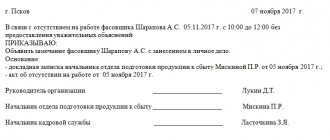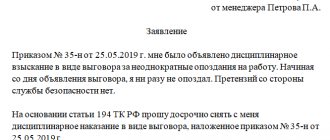Responsibility for violation of labor discipline arises when an employee does not perform or improperly performs his or her job duties. In Art. 192 of the Labor Code of the Russian Federation defines three disciplinary measures: reprimand, reprimand, and dismissal on appropriate grounds.
In the latter case, it is assumed that the employment agreement with the employee will be terminated, and in the first two cases, continuation of work in the company. Specifically, in a situation where an employee receives a disciplinary sanction in the form of a reprimand or reprimand, such a measure can be lifted. This cannot be done with dismissal, and the employee can only be reinstated when an illegal dismissal occurred. This is done by agreement with the employer or by court decision.
A disciplinary sanction is imposed on an employee for a certain period established by law. Upon completion of this period it is removed. However, withdrawal is possible before the end of the due date.
Does Article 192 of the Labor Code of the Russian Federation define a reprimand as a type of disciplinary sanction?
A reprimand, along with measures such as reprimand and dismissal, in accordance with the provisions of Art. 192 of the Labor Code of the Russian Federation is a type of disciplinary sanction. At the same time, the management of the enterprise must clearly understand why an employee can be reprimanded. The practical significance of a reprimand can be expressed in 2 main aspects:
- Firstly, a reprimand as a disciplinary sanction may be one of the legal grounds for the dismissal of an employee (Clause 5 of Article 81 of the Labor Code of the Russian Federation) for repeated failure to fulfill duties in the presence of a disciplinary sanction. At the same time, a reprimand, on the one hand, is a disciplinary sanction, and on the other hand, it is a fact that indicates at least a one-time failure by the employee to fulfill his duties. 2 reprimands, provided that they are legal (how to ensure their compliance with this, we will consider later), give the employer the right to dismiss the employee. But only if they were issued for various offenses (Article 193 of the Labor Code of the Russian Federation).
- Secondly, a reprimand can be considered as one of the measures to improve production discipline. From this point of view, its imposition has more psychological than legal significance. An employee who has received a reprimand recorded in his personal file will most likely want to rehabilitate himself in the eyes of the employer and will begin to work better.
Basic grounds for determining a reprimand
The concept and conditions under which a certain type of labor penalty - a reprimand - can be imposed on a worker are regulated by Article No. 192 of the Labor Code of the Russian Federation. This standard regulates the basic requirements for all types of disciplinary sanctions (DS). It is worth highlighting certain nuances contained in this document, which should be relied upon when imposing a form of punishment for an offense committed by a person in the workplace.
There are only 3 types of penalties, which vary in severity and consequences:
- A reprimand is the minimum punishment for an employee. It is intended to calm a person down, to draw his attention to the inadmissibility of behavior that violates the internal regulations established in the company. Warn that if certain situations are repeated, the punishment will be more significant.
- A reprimand is the second most severe penalty. This warning is already recorded on paper and can only be removed after time has passed or by a separate order from management. Note that for employees of law enforcement agencies there is a more serious sanction - a severe reprimand, but for “ordinary” employees this type is not used.
- Termination of a contract is an extreme measure that is used when an unlawful labor act is committed.
The most important purpose of a reprimand is to fix certain sanctions that will be applied to the offender. These can be either individual penalties or a complex of them:
- reprimand - written censure of a committed offense;
- an order which, as a rule, states that repeated violation of labor discipline may result in termination of the employment relationship;
- a person may also be deprived of bonus payments or subsidized compensation, and the deprivation can only apply to additional motivational funds; such fines do not apply to salaries; it is also legally prohibited to apply double punishment when, for example, an employee is not paid for work time during this period for absenteeism, and at the same time he loses his bonus.
The key point you need to know is that a reprimand cannot be issued orally (then this is classified as a simple remark by the Labor Code of the Russian Federation). The fact of imposing a penalty in the form of a reprimand must be ratified by a separate order for the company (we will talk about the preparation of such a document separately).
Please note that after the first reprimand, the offender cannot be dismissed (unless the offense falls under dismissal under certain articles of the Labor Code of the Russian Federation). But if labor discipline is violated again within one year, the person can be given a second reprimand and immediately fired “under the article.” But, note: this is allowed only on the condition that the second reprimand was issued for another type of labor offense, as Article 193 of the Labor Code of the Russian Federation says.
The following rule logically follows from the previous paragraph - a certain period is established for a reprimand, which according to the law lasts 1 year. After 12 months it is removed automatically. Moreover, the employer can initiate early removal of the punishment if the person realizes his misconduct and compensates for it with labor success. In this situation, the reprimand can be annulled, but, as when issuing a reprimand, this fact must be documented. That is, it is necessary to issue an appropriate order. Without a supporting document, the reprimand is considered valid. The employer also has the right to reduce the effect of the reprimand in local acts to any period.
The next important point is who has the right to reprimand the employee. The initiative to punish an employee, as a rule, comes from the immediate boss. It is he who starts the process of determining the type of punishment. The right to do this includes, among other things, senior managers (up to the general director), as well as the head of the personnel management service.
Grounds that may lead to a reprimand
You need to understand that the regulatory documents governing work penalties do not contain references to specific circumstances that may serve as reasons for determining a reprimand. Here the legislation is based on an adequate assessment of the seriousness of the offense committed by a person.
The acceptance of the summary defining the form of the DV that will be issued to the person remains with the immediate superior of the subordinate who violated discipline, the management committee of the organization or the general director.
And yet, when establishing a reprimand, it is worth basing it on certain types of violations.
The most common violation in personnel records management for which a reprimand is applied is absenteeism. Here it is important to correctly qualify what is recognized by law as absenteeism, and in what situations an employee cannot be punished for absence from the workplace.
Absenteeism is the actual absence of an employee from his/her workplace for four or more hours, unless it is agreed upon with immediate management. Naturally, only working time is considered, so leaving work early, for example, 3 hours earlier, cannot be considered absenteeism.
At the same time, a reprimand can be issued for a shorter period of absence, if this is established in the internal regulations of the company.
It is important to take into account that the legislation provides for situations during which not being at work can be regarded neither as absenteeism, nor as simply unauthorized leaving the workplace:
- When an employer calls an employee to the workplace on his day off. Or a person does not go to work after hours.
- You cannot accuse a person of absenteeism if he does not want to interrupt his legal vacation. Even if there is a rush at work, the company has the right to call a person to the workplace only with his written consent. If he does not sign it, then he is on official leave.
- If a person refuses to work more than forty hours a week (see Article 91 of the Code).
- There are situations when the employer adjusts the “floating” shift schedule, but if the employee is not familiar with this information on receipt, the fact of his absence from the workplace during this period cannot be recognized as absenteeism. Even if information about this was posted on the notice board, and even more so if the employee was simply told about it orally, issuing a penalty in this case would be illegal.
- When a person, being a donor, leaves to fulfill his voluntary duties, he cannot be accused of absenteeism.
- The fact that a person was detained by the police or summoned to court or other government agencies is also considered a valid reason for absence from work. organs.
The next offense that provides for this type of penalty is the employee’s failure to fulfill his official duties, as well as failure to comply with the orders of superior management. But here it is important to understand that punishment can be strictly only for evading the functionality that is reflected in the employee’s job description and employment contract. So, for example, an employee’s refusal to perform work in the event of a danger to his life or health due to violation of labor safety instructions cannot entail a reprimand. It is also impossible to punish a person if he refuses to do hard work or work with harmful conditions, when this point is not reflected in the employment contract.
As for the more common and simple mistakes of the employer, it is worth noting that if a person’s agreement, for example, does not contain a clause on maintaining document flow within his competence, then reprimand him for making mistakes when concluding an agreement that caused financial damage to the company , it is forbidden. If the employee in this case turns to the regulatory authorities with a demand to lift the penalty, the authority will take his side.
A serious offense for which you can be immediately fired “under the article”, or you can limit yourself to a reprimand so that the person realizes the severity of the violation and corrects himself, is being intoxicated at the workplace. But here the decision is made only by the employer. If the manager believes that the person has a chance, a reprimand will be the mildest punishment for the offender.
This type of offense with similar consequences also includes theft from an employer, clients or colleagues, deliberate damage to company property or embezzlement of funds.
Note that the employing company has the right to reflect in its internal regulations also certain types of violations of labor discipline, which may be followed by a reprimand. The main thing is that this be declared in a regulation with which all employees should be familiar. In this case, you need to draw up a familiarization sheet for the position, where employees hired will sign. So, if this is recorded in a local document, a reprimand may follow:
- in case of systematic lateness to work;
- incorrect attitude towards partners, clients or colleagues (insults, fights, etc.);
- refusal to undergo a medical examination or training in safety and civil regulations, etc.
How to reprimand for improper performance of official duties
The official issuance of a reprimand is a legal fact, so this procedure must be properly formalized. The Labor Code of the Russian Federation and other federal regulations do not contain regulations that would determine how a reprimand is issued, but, based on practice, this action is recommended to be carried out according to the following algorithm:
- Firstly, the employer must document the fact of failure (or incorrect performance) by the employee of his duties. Most often, this is done by sending a memo to the director of the company by the immediate supervisor of the employee who committed the misconduct. An offense can also be recorded using a report drawn up by a commission formed by the head of the company to evaluate the employee’s actions.
- Secondly, the employer, before issuing a reprimand, must give the employee the opportunity to explain the actions he committed. To do this, it is necessary to send the employee a notice of the submission of an explanatory note.
- Thirdly, the employer needs to wait 2 days - this is how much time the employee has to draw up an explanatory note (Article 193 of the Labor Code of the Russian Federation). If he does not do this, the employer should draw up a corresponding act. Further (and also in the event that an explanation is presented, but the employee’s arguments do not look convincing), a reprimand can already be issued.
A reprimand is issued by issuing an order signed by the head of the company.
The order to issue a reprimand must:
- indicate that all the documents that we mentioned above are attached to it: a memorandum of misconduct (or an act of the commission), a notice of the need to submit an explanatory note, the explanatory note itself or an act of failure to submit it;
- indicate the dates and names of the relevant documents.
The order to issue a reprimand must be signed by:
- head of the company;
- by the employee himself within 3 days from the date of drawing up the order.
If the employee refuses to sign the document, it will be necessary to draw up a report about this (Article 193 of the Labor Code of the Russian Federation).
Information about the reprimand of an employee can be recorded in the personal file.
How to recover material damage from an employee
Material damage can only be recovered from employees with whom an agreement on material liability has been concluded or a provision regarding this is included in the employment contract. By signing the contract, the employee accepts the obligation to carefully store the employer’s property (paragraph 7, part 2, article 21 of the Labor Code of the Russian Federation).
It is possible to recover damages from an employee only if 4 conditions are simultaneously met:
- the employee’s actions are illegal (including cases where the person’s inaction leads to damage);
- the organization has suffered material damage, the amount of which is expressed in money;
- there is a cause-and-effect relationship between the employee’s action or inaction and the resulting damage;
- the employee's guilt has been established.
To prove the legality of recovery of damages, you need to draw up documents that prove the presence of all four factors. Otherwise, the employee may challenge his holding of financial liability in court.
Sometimes the cause of material damage is force majeure circumstances: natural phenomena, riots, military actions - such losses cannot be recovered from an employee who did not ensure the safety of valuables. In addition, damage caused in situations of extreme necessity or self-defense is not subject to compensation (Article 239 of the Labor Code of the Russian Federation).
Amount of financial liability
The financial responsibility of employees is divided into full and incomplete. Full financial liability occurs in the following cases (Article 242 of the Labor Code of the Russian Federation, Article 243 of the Labor Code of the Russian Federation):
- An agreement on full material individual or collective responsibility has been concluded between the employee and the employer. The list of positions with which such an agreement is concluded is indicated in the Resolution of the Ministry of Labor dated December 31, 2002 No. 85;
- the damage was caused during non-working hours or while not performing one’s job duties;
- the damage was caused by the employee’s actions, which were recognized as an administrative offense. This is confirmed by a ruling of a court, commission or other government agency;
- the employee’s actions are recognized as a crime, which is confirmed by the verdict or court decision;
- the employee disclosed a commercial, state or other secret protected by law;
- the damage was caused by the employee intentionally or while under the influence of alcohol or drugs, which is confirmed by the conclusion of a medical commission.
In all other cases, incomplete material damage is recovered from the employee. Incomplete material damage cannot exceed the amount of the employee’s average monthly earnings (Article 241 of the Labor Code of the Russian Federation).
For example, an employee inadvertently disabled a machine. Over the past 6 months, his average salary was 45,000 rubles, and the repair of the machine cost the company 80,000 rubles.
You can only recover 45,000 rubles from an employee. At the same time, a monthly deduction from salary exceeding 20% of his earnings is possible only at the request of the employee. By written agreement between the employer and the employee, he can pay the amount of damage in a lump sum or carry out the work himself.
Full financial liability is established in cases where a drunk driver gets into an accident on a company vehicle or a forwarder delivering goods for delivery embezzles customers’ money. In trade, there is often a shortage of goods intended for sale. In such situations, the employer has the right to recover the full amount of damage caused to the company.
To prevent an employee from escaping responsibility, follow the rules for collecting material damage from the perpetrators and enter into agreements on the financial liability of employees.
How to recover material damage from an employee
To recover damages from the guilty party, arrange for the employee to be held accountable in accordance with all the rules.
Create a commission and conduct an investigation into the causes and circumstances of what happened
Depending on the size of the company and the scope of its activities, the labor commission can act permanently, on the basis of special regulations, or can be appointed individually for each case. All members of the commission, as well as the guilty person, are required to attend the inspection activities.
Describe in as much detail as possible the event that occurred, the damage caused and the actions of the perpetrators. All members of the commission sign acts and other inspection materials to confirm the accuracy of the information (Article 247 of the Labor Code of the Russian Federation). The inspection report is approved by the head of the organization.
Establish the exact amount of damage caused
Determine the cost of lost or damaged goods for sale, raw materials or materials of the company from accounting documents, for example, from invoices, according to which raw materials or supplies were purchased. In addition, in relation to vehicles, machines and equipment, it is worth conducting an independent appraisal examination, which will establish average market prices for similar property in your region (Article 246 of the Labor Code of the Russian Federation).
At the end of the investigation, you should have an expert opinion or report that indicates the full actual damage caused to the organization.
Familiarize those responsible with the results of the investigation against signature
Give the employee a copy of the act and offer to write an explanatory note. If the employee refuses to receive the documents, read the document out loud to him in the presence of witnesses and draw up a document of familiarization. After this, send both documents by registered mail to the employee’s home address.
Prepare local regulations
Issue an order or instruction in which you establish the person at fault, the circumstances of the incident and the amount of material damage caused. Determine the amount of damages to be recovered from the employee. The deadline for preparing an order is one month from the date the exact amount of damage is established. The period for compensation of losses is one month from the date of signing the order.
If the damage is greater than the employee's average monthly earnings, the law provides for voluntary written agreements. With the consent of the employer, the violator can compensate for losses in installments according to a schedule, repair property at his own expense, or transfer property to the company to replace the lost one (Article 248 of the Labor Code of the Russian Federation).
Take measures to find the employee if he does not get in touch
Often employees do not sign documents, stop going to work and get lost.
In this case:
- submit an application to the police to search for the missing employee;
- record a violation of labor discipline according to the rules described in the second section;
- issue an order to dismiss the employee;
- send him a work book and all documents confirming the legality of the dismissal by valuable letter to his home address. Be sure to attach reports that record the amount of material damage and the fact of its discovery;
- on the basis of an order for the collection of funds, withhold the salary due to the employee and compensation for vacation to pay off losses. If the employee’s salary is enough to cover all the damage, transfer the balance to the card or deposit it in the cash register.
File a lawsuit against an employee who refuses to compensate for the damage caused.
If the damage is not compensated by the employee voluntarily or his salary does not cover the entire amount, you can go to court (Part 2 of Article 391 of the Labor Code of the Russian Federation). The period for such appeal is one year from the moment of discovery of the damage caused (Part 3 of Article 392 of the Labor Code of the Russian Federation).
Is it possible to reprimand without reprimand and is it issued for absence from work?
A remark is also a disciplinary sanction, but is considered a milder sanction, since Art. 192 of the Labor Code of the Russian Federation is slightly higher in the list of punishments. A reasonable question arises: should a reprimand be preceded by a reprimand, or can it be avoided?
Labor legislation does not rank punishments according to the degree of guilt and does not establish a strict sequence for their imposition. Therefore, the employer himself has the right to assess how great the employee’s guilt in the violation is and what sanction he deserves.
Thus, a reprimand may be issued for absence from work if there were valid reasons for missing work time, a reprimand may be issued if this was done deliberately without significant grounds, and even dismissal is possible when such a violation is systemic in nature.
Here only one constant principle should be observed: one violation - one type of punishment.
What violations can the labor inspectorate detect?
Dissatisfied workers most often go to complain to the State Labor Inspectorate (hereinafter referred to as the State Labor Inspectorate).
State Labor Inspectorate is the main supervisory body in the field of labor relations. After receiving a complaint from an employee, labor inspectors begin an investigation and come to check the employing company.
During the inspection, controllers have the right to request any information and documents related to the registration of labor relations. This is why the frequent result is a large number of citations and fines unrelated to the original complaint.
Here are the violations that the State Inspectorate often finds during inspections:
- Violations when concluding, amending and terminating employment contracts.
Most often, employers are punished for the absence of employment contracts or the lack of information in them about the employee’s salary (salary, tariff rate, allowances, etc.). Many people, when hiring, forget to familiarize employees with the internal labor regulations, regulations on remuneration, job descriptions, orders for hiring or transfer to another position and other internal documents; - Violations of the rules for maintaining and storing work books.
For example, making records of employment or transfer to another position retroactively, storing them not in a safe, but in ordinary cabinets or cabinets; - Violations in payment.
Among them are payment of wages once a month, delay of wages, non-payment of compensation for vacation and other amounts at the time of dismissal of the employee; - Violations of labor discipline and application of penalties.
The most common violation of this type is the absence of written explanations from the perpetrators or an act that records the fact that it is impossible to obtain explanations. For this reason, the State Tax Inspectorate may cancel the imposed disciplinary sanction. In addition, employers often miss the one-month deadline established for imposing penalties; - Violations of labor protection, work and rest schedules.
There are a lot of such violations, since they depend on the category of the enterprise. More often than others, there is a lack of workplace certification and medical examination of employees. Many people ignore internal planned training of workers in labor safety. Violations are often committed during the investigation and registration of industrial accidents. Violations of the work and rest regime are associated with the absence of regulations (orders, regulations, instructions) that establish work schedules, shift schedules or vacations; - Violations of legal requirements when hiring foreign workers.
Employers ignore the requirements of the law, according to which the organization must obtain permission to hire foreign workers within the quota. The foreign citizen himself needs to obtain a work permit and a patent confirming his legal presence in the country.
As a result of the inspection, the State Tax Inspectorate issues orders to organizations to eliminate violations or imposes a fine. For an official and individual entrepreneur in the range from 1,000 to 5,000 rubles, for an organization - 30,000 - 200,000 rubles.
The most “expensive” labor protection violations range from 50,000 to 200,000 rubles. If the violation is committed repeatedly, the official is subject to disqualification, and the organization’s activities are subject to suspension for up to 90 days (Article 5.27.1 of the Code of Administrative Offenses of the Russian Federation).
The State Tax Inspectorate may impose a fine for each identified violation in relation to each employee. The total amount of sanctions against the organization can amount to millions of rubles.
When is a reprimand issued?
A reprimand, like any other disciplinary sanction, must be issued by the employer within a month after the employee’s misconduct is revealed. The company has no right to punish the employee later. This period may be extended if the employee is absent from work due to being on sick leave or on vacation (including study).
The maximum period within which an employer has the right to issue a reprimand is 6 months. However, if a misconduct is revealed during an audit (for example, an audit), a reprimand can be issued no more than 2 years from the established date of the commission of this misconduct.
Mistakes of employers that cause them to lose labor disputes
If the employee and employer do not reach mutual understanding, their employment relationship ends in court. Here are court decisions that resulted in losses for employers. Let's look at their mistakes.
The procedure for imposing disciplinary sanctions was not followed
The essence of the dispute.
In court, the employee demanded that the imposition of a disciplinary sanction in the form of dismissal be declared unlawful, as well as that he be reinstated in his position and paid wages for the period of forced absence. The first and appellate instances supported the employer, but the Supreme Court overturned these decisions. He pointed out that the order imposing a disciplinary sanction on the employee did not contain information about the misconduct that became the basis for the punishment.
Conclusions of the court.
When considering cases of imposition of disciplinary sanctions and their consequences, courts must check whether the employer complied with the procedure for imposing disciplinary sanctions (Decision of the Supreme Court dated March 12, 2021 No. 18-KG17-290).
A full check of the circumstances of the shortage was not carried out, explanations were not received from the punished employee
The essence of the dispute.
The company went to court with a demand to recover money from the employee in the amount of the previously identified shortage. The employee was the head of the organization and the financially responsible person. During the transfer of cases upon his dismissal, a shortage of more than 200 thousand rubles was revealed. The courts of first and appellate instances supported the employer. The Judicial Collegium for Civil Cases of the Supreme Court of the Russian Federation drew the attention of lower courts to the fact that the commission carried out the inspection in the absence of the guilty person. The inspection materials do not contain the employee’s explanations or information about his familiarization with the inspection materials.
Conclusions of the court. Before making a decision on compensation for damage by specific employees, the employer is obliged to conduct a full check of the circumstances of the incident and request written explanations from the employee (Decision of the Supreme Court dated May 7, 2021 No. 66-KG18-6).
The amount of damage is not documented
The essence of the dispute.
An entrepreneur engaged in trading filed a lawsuit against the former seller to recover the amount of the shortage identified during the audit. The courts of two instances supported the entrepreneur, but in the Supreme Court the judicial panel for civil cases overturned their decisions. The grounds for cancellation were incorrect execution of accounting documents, which were used to determine the amount of damage, and information that the employer employed sellers who were not officially registered.
Conclusions of the court.
The employer is obliged to accurately and reliably prove the amount of damage and the fact that the damage was caused by the person at fault (Determination of the Judicial Collegium for Civil Cases of the Supreme Court of the Russian Federation dated August 20, 2021 No. 18-КГ18-126).
Sample reprimand for improper performance of official duties
In order not to create a new document every time and not remember how this or that information is presented in it, it is better for the company to use a ready-made template. We present one version of the document on the website. Before reprimanding an employee, management will have to take this example as a basis and, if necessary, changing the wording and surname of the offending employee, print the required order.
How can an employer cancel a reprimand?
It happens that the employer comes to the conclusion that the employee was punished unlawfully and wants to remove the reprimand from him. How can I do that?
Very simple. All that is required to cancel a reprimand is to issue an appropriate order from the head of the company. It can be drawn up at any time (Article 194 of the Labor Code of the Russian Federation). The order to remove the reprimand must contain a reference to the order to issue the reprimand, indicating its date and number. You can see a sample order to remove a reprimand in the ConsultantPlus system. To do this, sign up for a free trial access to the system.
The employee himself or his immediate superior can also apply to have the reprimand lifted.
A sample of drawing up a petition to lift a disciplinary sanction was prepared by K+ experts. Get a free trial access to the system and proceed to the sample.
An employee is considered to have a disciplinary sanction after it has been issued for exactly 1 year, if during this time he does not commit other offenses, followed by other disciplinary sanctions (Article 194 of the Labor Code of the Russian Federation). In this regard, there is one more option for removing a reprimand from an employee - wait for its automatic cancellation.
Legal consequences of a reprimand for an employee at work
According to Art. 66 of the Labor Code of the Russian Federation, data on the reprimand are not recorded in the work book. As a last resort, the personnel service may (but is not obligated to) enter information about the reprimand into the employee’s personal card, which is an internal document. So the new employer, as well as any other entity, most likely will not know that any disciplinary action has been taken against the person.
This means that from the point of view of relations with the new employer (or some other persons legally independent of the current employer), the presence of a reprimand at work will not have significant legal consequences for the employee.
But the employee may be interested in maintaining his current job. And in this case, it will be useful for him to pay attention to one nuance.
In accordance with paragraph 5 of Art. 81 of the Labor Code of the Russian Federation, the employer has the right to dismiss an employee if he repeatedly fails to fulfill his official duties. This includes an offense for which the employee was reprimanded. The nuance is that the employer can use the following interesting mechanism for applying the norms of paragraph 5 of Art. 81 of the Labor Code of the Russian Federation, taking into account the provisions of Art. 193 of the Labor Code of the Russian Federation, establishing a one-month period for issuing disciplinary sanctions.
Having discovered an employee’s misconduct, the employer can, according to the established scheme, reprimand him and immediately issue a new order - for some other offense within a month’s prescription (if, of course, there was such an offense).
It turns out that the employer will have 2 proven facts of violation of labor discipline and he will immediately have the right to dismiss the employee. So employees who have once committed an offense to which the employer seems to have turned a blind eye should not provoke their superiors to impose an official disciplinary sanction - it may have direct legal consequences for them in the form of dismissal.
Terms used in the article
Labor Code of the Russian Federation (LC RF)
- the basic law that regulates the relationship between employee and employer.
Probation
- a period of time that helps the employer determine the employee’s skills and abilities, his professional suitability and personality traits.
Disciplinary offense
— failure to perform or improper performance of labor duties by an employee.
Disciplinary action
— punishment of an employee for a disciplinary offense. Types of punishment: reprimand, reprimand, dismissal.
Rebuke
- verbal punishment. Applies in case of minor violation or omission in work. Information about the reprimand is entered into the employee’s personal card.
Comment
- verbal critical expression of opinion about the action or behavior of an employee. The mildest disciplinary action. Information about the comment is entered into the employee’s personal card.
Material damage
- monetary value of damaged or lost property of an employer, employee or third party.
State Labor Inspectorate (hereinafter referred to as the State Labor Inspectorate)
- a government body that ensures that employers do not violate labor laws.
Reprimanding an employee: legal consequences for the employer
A reprimand is a legal fact, and it must be correctly executed. Many people forget that, for example, the Labor Code of the Russian Federation does not provide for any severe reprimands. The employer has no right to officially use this phrase. If he nevertheless gives the employee a severe reprimand, then the labor inspectorate (if the employee complains there) can:
- firstly, impose an impressive fine on the company based on clause 1 of Art. 5.27 Code of Administrative Offenses of the Russian Federation;
- and secondly, to cancel the order imposing a severe reprimand.
In addition, the employer has the right to impose any disciplinary sanction, including a reprimand, only if the employee fails to perform or performs his job duties incorrectly. However, these responsibilities must be recorded somewhere: in a contract, job description, labor regulations. And if the employer for some reason did not familiarize the employee with his duties against signature, then he does not have the right to reprimand for their failure to fulfill them.
Dismissal on the basis of a severe reprimand, other non-existent disciplinary sanctions, as well as when the reprimand is issued outside the regulatory framework, can be successfully appealed by the employee in court with a high probability of success. As a result, the court may oblige the employer to reinstate the person at work. And immediately. If the company does not do this, it will have to pay the employee a salary for the time that he was absent from the workplace, although by virtue of a court decision he should have been present (Article 396 of the Labor Code of the Russian Federation).
How to fire an employee who has not passed the probationary period
In pursuit of a decent job, the candidate writes the perfect resume and prepares for an interview. This does not make him a good specialist, but it may mislead you. After 3–4 weeks, you realize that the newcomer does not have the necessary knowledge and skills.
Why is a probationary period needed?
Parting with an incompetent employee before the end of the probationary period is the only way to correct the situation.
The test will show the abilities and character of the future employee. It lasts from two weeks to three months for ordinary employees, and for managers, their deputies and chief accountants - up to six months (Article 70 of the Labor Code of the Russian Federation).
A probationary period clause in an employment contract will allow you to fire an unsuitable employee; without such a clause this cannot be done. If you allow an employee to work before concluding an employment contract, draw up a separate probationary agreement.
If the employment contract does not contain a clause on a probationary period, it is also possible to fire an employee due to incompetence. This option is more complicated - you will have to create a commission and attract an expert who will assess the employee’s competence.
Who should not be tested
Not all employees can be given a probationary period when hired (Article 70 of the Labor Code of the Russian Federation). If a trial is appointed by agreement of the parties, in a conflict situation the court will recognize the contract as an employment contract without establishing a probationary period.
The following are not subject to employment testing:
- pregnant women and mothers with children under one and a half years old;
- young people entering work for the first time in their specialty after graduating from a higher or secondary state educational institution (within one year after graduation);
- persons who get a job for up to two months;
- young people under 18 years of age;
- persons who were elected to a vacant position through a competition held under labor or special legislation (usually applies to civil servants, scientists and officials);
- persons who were elected to an elective position (applies to positions in municipal or state bodies).
How to dismiss an employee who fails the test
If you decide that the employee cannot perform the job competently and conscientiously, or his character makes it difficult to interact with colleagues, fire him as having failed the test. This can only be done during the probationary period; if the period has ended and the employee continues to work, he is considered to have passed the test.
To prove the legality of dismissal in court, you need to:
- Check to see if the test is legal.
An employment contract must be signed between the employer and employee. The employee must be familiarized, against signature, with the employment order, job description, labor regulations, labor safety rules, information on a special assessment of working conditions and other internal documents. The employee must not be part of a group of persons for whom a probationary period is not established; - Prepare evidence that the employee did not pass the test:
a conclusion that the employee did not pass the test; - disciplinary orders;
- memos from the head of the department in which the applicant works;
- customer complaints;
- explanatory notes from the employee;
- other documents.
Keep evidence of familiarization: the employee’s personal signature on the second copy or a receipt for sending it by mail in the event of the employee’s absence. If an employee is at the workplace, but refuses to receive the notification in person, read the document out loud to him in the presence of two witnesses, and then draw up an act of familiarization. In the notice, indicate the date of termination of the employment contract, the reasons for dismissal and the documents from the previous paragraph that confirm the incompetence of the employee;
It is important for the employer to fulfill all conditions of dismissal and draw up documents correctly. Failure to comply with the legal procedure may result in the dismissal being declared illegal.
During the probationary period, you evaluate not only the employee’s work skills and abilities, but also how he observes work discipline or interacts with colleagues.









